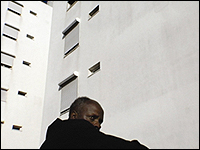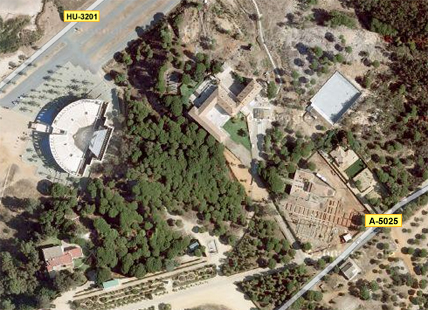Líneas de investigación
Proyectos en Curso
Proyectos Anteriores
 Narrativas de fuga. Conversaciones en torno a la construcción de discursos en el arte contemporáneo
Narrativas de fuga. Conversaciones en torno a la construcción de discursos en el arte contemporáneo  Narratives in Fugue IV. Pedro Costa
Narratives in Fugue IV. Pedro Costa
Narratives in Fugue IV. Pedro Costa |
|
Workshop (Admittance by prior registration):
INTRODUCTIONThe cinema of Pedro Costa raises fundamental questions about the political power of this artistic practice, suggesting new ways of feeling and of doing things to develop a new framework of commitment in representing reality. Like fictional essays, his films approach reality without entering it and, rather than making a show of denouncing it, condense it. His images resist any kind of naturalism, stylising reality down to its essence. With radical use of devices such as time and space, it is by artifice, that is to say the spatial treatment of the shot (which is usually fixed), the flow of words, editing and sound (often from a scene playing off-camera), that the complex reality of a particular world is revealed. The workshop will discuss the film-maker’s aesthetic position on his break with the theoretical division between fiction and documentary, in what Costa has called documentaries about sensibilities. These films are meticulously constructed in expanded time, a time that persists rather than flowing on, that resists the present and eliminates any spontaneity or improvisation, while transforming itself into the human and political memory of a group. They are not there to be taken and consumed, rather the product of the experience of sharing a time and a life. Taking as a starting point his films Ossos [Bones], No Quarto da Vanda [In Vanda’s Room], Juventude em marcha [Youth on the March, released in English-speaking countries as Colossal Youth] and Où gît votre sourire enfoui? [Where does your Smile lie Hidden?], Costa will talk about his commitment to presenting human beings in front of the camera, without false formality, stripped down to their depths; and about what this means in terms of vulnerability and disturbing the complacency which cinema provides for the viewer. In contrast to the naturalistic image usual in our spectacle-loving society, Costa gives us a rigidly framed reality, without empathy or identification. By looking at the films of other film-makers, such as John Ford, Raoul Walsh, Charlie Chaplin, Yosijiro Ozu, Kenji Mizoguchi, Bresson and Jaques Tourneur, Pedro Costa will also talk about how cinema can represent resistance to the excesses of the world and the things in it, about striving always to be less, to find the right feeling, the essential question that may make us notice for the first time what has always been there in front of us.
WORKSHOPWORKSHOP The workshop, led by Pedro Costa*, will be held over three days with morning and afternoon sessions, including debates, film viewings and practical experiment. The aim of the workshop is not to contribute to the proliferation of new cultural products but to reflect, in the company of Pedro Costa and his films, on the possibilities of cultural action in the face of an industry capable of absorbing any product. We shall try to investigate the content and meaning of a political cinema (and art) that must not aim just to reproduce the status quo but to discover things; and we shall discuss the role the auteur should play today in relation to the spectator-consumer, his ability to “move consumers towards production, turn readers or spectators into collaborators”. Ángel Quintana**, who will share one of the workshop sessions with Pedro Costa, points out how the film-maker has experimented with digital cameras, researched the inner flows of computer images, looked at how the shapes, lines and masses make up the closed aesthetic of a shot, or at how the inclusion of a certain sound produces a change in meaning. “Costa envisioned a new concept of the shot, stretched out to contain a figurative universe that reveals a whole world of possibility”. Walter Benjamin said that “transmitting an apparatus of production without –as much as possible– transforming it, is a highly debatable procedure even when the content of the apparatus which is transmitted seems to be revolutionary in nature”. Pedro Costa has confirmed the political nature of his film making through its very consistency and in the way technique is used in its production. He is therefore able to “guide other producers towards production and put an improved apparatus at their disposal”.
* Pedro Costa (born in Lisbon in 1959) is a member, with Teresa Villaverde, Rita Azevedo Gomes and João Pedro Rodrigues, among others, of the group of film-makers who emerged in Portugal in the nineties, known as the “fourth generation”. These powerful individual visions came together to create a cinema of resistance, working on the fringes, exploring a harsh reality and giving visibility to figures (with empty eyes, erratic movements and uncertain futures) and territories (marginal, ruined and without escape) that otherwise remained hidden. They raised discordant, jarring voices against the homogeneous mainstream, both political and economic, of a splendidly united and modern Europe absorbed by the frenetic directives of the current world. Costa’s films include O Sangue [Blood], 1989; Ossos [Bones], 1997; No Quarto da Vanda [In Vanda’s Room], 2000; Où gît votre sourire enfoui? [Where does your Smile lie Hidden?], 2001 and Juventude em Marcha [Youth on the March, released in English-speaking countries as Colossal Youth], 2006. ** The Saturday 12th session will be attended by Ángel Quintana, who has a doctorate in Audiovisual Communication from the Universidad Autónoma de Barcelona and is Senior Lecturer in History and Theory of Cinema at the Universidad de Girona. He is head, for Catalonia, of the magazine Cahiers du Cinéma and the author of books including Fábulas de lo visible. El cine como creador de realidades [Fables of the Visible. Film as Creator of Realities] (El Acantilado, 2003). He is about to publish Después del cine [After Cinema] (El Acantilado).
REGISTRATIONREGISTRATION Advance registration is required in order to attend the workshop and it is intended for professionals and students from the field of contemporary arts and cinema (directors, critics, producers, artists, curators and people from other backgrounds who find themselves asking, in their work, about the relationship between artistic practice and its context).
Maximum number of participants: 20. Applications should be made by filling this form or else by sending an email to Esta dirección de correo electrónico está protegida contra los robots de spam, necesita tener Javascript activado para poder verla before 14.00 on 1st March 2011, including personal details (name, surname, address, telephone number and e-mail address), curriculum vitae and your thoughts on why you would like to take part. The director of the workshop will make the selection and those chosen will be informed of their admittance and how to pay.
|
||||


